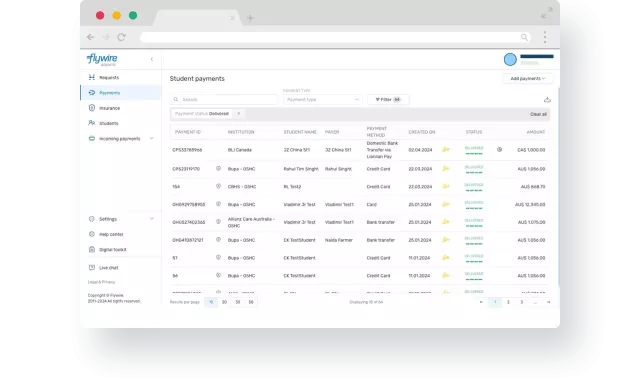English | 中文 | Español (LATAM) | Português (Brazil) | Tiếng Việt | हिंदी
The future for international education agents is bright. They have proven their worth with institutions in the hottest areas for international study, and schools will look to their services even more in the future, with many schools looking to at least double their use over the next five years.
That’s what 500+ institutions across Australia, Canada*, Mexico, the US and the UK, who partner with education agents, told us in a recently-commissioned survey aimed at better understanding that relationship.
Overall, admissions and international student office leaders who work with education agents are happy with the partnerships. They will look to education agents to strengthen student flows from existing markets and open new ones. This may become increasingly important as policy changes still in motion shift international student destinations. Education agents are supporting many parts of the international student journey, and global institutions will look to them to do even more in the future.
The research sheds light on ways education agents can strengthen their relationships with the institutions that they partner, to attract new partners, and best serve institutions as needs and environments change.
* Please note, this survey was administered before recent policy changes that may impact international study in Canada and Australia. However, in a separate focus group survey conducted by Flywire, agents expressed optimism in their ability to navigate changing policies, referencing their resilience throughout other periods of regulatory uncertainty and even new opportunities to place students in different target markets.
Relationship between education agents and institutions are strong
Education agents are getting an A+ from their institutional partners
Agents are indispensable to international student recruitment – and likely will become more vital in helping students navigate policy changes in some of the top countries of study such as Canada and Australia. As one agent put it “regulations are constantly changing and opportunities are varied. Agencies are able to manage and adapt to the changes.”
92% of the institutions surveyed consider education agents indispensable for their institution when it comes to recruiting international students. Education agents are an important part of today’s universities – recruiting at least between 10-25% of international students at the colleges and universities surveyed.
There’s widespread agreement that recruiting international students would be a lot more difficult without agents (94%). They value the relationship, and say that education agents are valuable connectors between students and institutions. They agree that working with agents helps expand their reach internationally (98%).

Agents are getting high marks from the institutions they work with. Institutions surveyed said they are satisfied and/or very satisfied with:
Mexico is a particularly bright spot for agents. Nearly all of the institutions from that country surveyed say they want agents’ help with the recruitment process and that recruiting from other countries is important.
Institutions are planning to increase their use of agents
Looking ahead five years – the outlook for education agent growth is very positive.
More than 82% of institutions say they see themselves using agents more. In Canada, Mexico and Australia, that number is even higher – with more than ⅓ in each saying that use will be much more.
Of the 82% of institutions that say they will use agents more – roughly half said they will increase their use of education agents by 50-75%.
TAKEAWAYS
3 takeaways for education agents to strengthen their relationships with institutions
1. Institutions are moving outside of traditional source markets, and looking for help recruiting from different countries in Asia-Pacific and Latin America.
When asked which countries they would like to recruit from that they are currently not recruiting from, more than half of institutions said they were interested in recruiting from Asia-Pacific countries not listed on the survey. This was followed by Brazil (45%), the Middle East (44%), Japan (43%) and South American countries not listed (41%).
2. Institutions rely on agents for help across the international student journey.
Institutions rely on education agents to do a lot of work across the international recruitment spectrum. This includes:
- To expand into a market they currently recruit from (59%)
- To double down on a strong market (57%)
- To open a completely new market (46%)
More than half of Australian institutions said they are looking to agents to open new markets they haven’t recruited from before. Institutions in Canada, Mexico and the UK are more likely to say they want help focusing on a market that they normally receive a lot of students from already. Institutions in the US are the most likely to look to agents to expand into markets that were formerly a strong source of international students.
Agents are viewed as:
- ambassadors for their institution (95%)
- an extension of the institution’s brand (95%)
Institutions also rely on agents to:
- fill in students applications all or some of the time (92%)
- provide advice on payment processes (92%)
3. Institutions prefer certified agents, but there are country-specific exceptions
Institutions carefully vet agent relationships – with 93% agreeing that it is important to vet agents prior to working with them. Nearly 60% of those surveyed said all of the agents they work with must be certified. But a full 41% said it depends on the country.
There are some differences in the priority placed on certification by country – with institutions in Mexico placing less emphasis on it than the other countries surveyed.
CHECKLIST
What can agents do to improve the relationships with global higher education institutions?

1. Recommend solutions for key parts of the process, such as application management and payments.
Institutions told us that they felt they needed to do more to help agents with the recruitment process (92%). They are also not wholly satisfied with the solutions they have in place for important parts of the recruitment process.
Institutions are looking for improvements to solutions for:
2. Be where institutions are looking for you.
How do universities find agents?
The Flywire Agent Platform in action at EIC Education
See how EIC Education, one of the largest international education companies in China, uses Flywire to enhance its one-stop services for Chinese students’ international study needs. The team gets better visibility into payments with the Flywire agent platform, and benefits from Flywire’s in-country support when student payers or its own team have questions.
3. Improve and standardize communication.
Asked about the challenges in working with agents, 38% cited a lack of communication and another 34%, a lack of control over what they say to students. This was a greater challenge for institutions in Canada and the UK.
The power of Flywire’s global agent network
Leading agents know how important it is to improve payment processes and how attention to this can help them stand apart and better serve their institutions.
Our Agent Platform connects education agents, institutions and students to streamline the tuition payment process. Agents can centralize all student information, send payment notifications, track payment statuses, and help students access fair-market exchange rates.
Connect with a member of the Flywire Agent team today
Methodology
Flywire commissioned Regina Corso Consulting to conduct a survey of higher education leaders who work in a college or university to understand how they feel about working with education agents.
The survey included 526 higher ed leaders who work in the admissions or international student office. This includes Australia (107), Canada (105), Mexico (104). U.K. (105), and US (105). The survey was conducted online between Dec. 5-12 2023.
English | 中文 | Español (LATAM) | Português (Brazil) | Tiếng Việt | हिंदी







